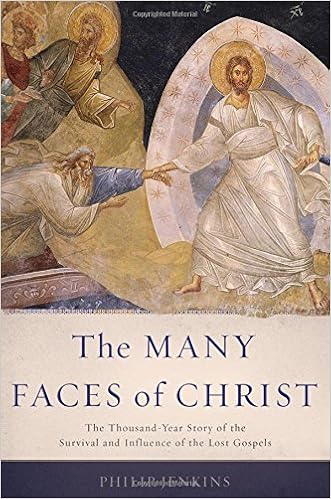
The "lead me not into temptation" issue of the Christian Century magazine, otherwise known as the Fall Books issue arrived earlier this week. I confess that I have ordered a book or four on the basis of reviews I read, and I lust after others. There are a number of helpful reviews of books I would like, but will not order because I have to be a realist about time. One has the lengthy title The Many Faces of Christ: The Thousand-Year Story of the Survival and Influence of the Lost Gospels by Philip Jenkins. Phew -- that's a mouthful.
Jenkins considers the so-called lost gospels, the ones which didn't make the cut in the fourth century. Opening up the New Testament reminds us that Matthew, Mark, Luke and John were the ones chosen as canonical, but originally there were many others.
I have always assumed that the 4th century decision-making was the end of the story. In fact, many of these gospels continued to play a part in the church for centuries, as prose, but also in art and poetry. It wasn't until 16th century reformations that they faded into the background of church life. Luther's sola scriptura and the invention of the printing press demanded precision which reduced the diversity of beliefs and practices.
The minimizing of some of these other gospels wasn't necessarily a bad thing. The Infancy Gospel of Thomas has Jesus killing some village kids who won't obey him and blinding others. We can live without these images of boy Jesus.
Reviewer Margaret Miles quotes Jenkins to remind us that "at no point in Christian history have believers been united into one single united church." And as we explore what it means to be Christian in the 21st century we can make room for diversity.
Thoughts?
No comments:
Post a Comment